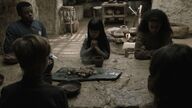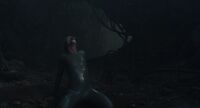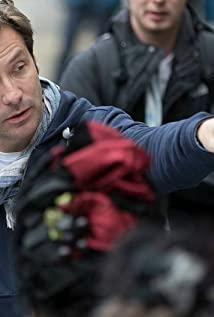1. Does Thor exist?
The highest level of theist survivors is actually the most ungodly believer. From his words and deeds, we will find that, to a large extent, he is only doing selfish things in the name of Saul, and God is just one of him. tool. The "God’s Blessing" that the believers talk about at any time and anywhere, they can neither eat nor drink nor protect them from the abuse of spirit callers. In the first 1-3 episodes, under the director’s deliberate guidance, the audience It's easy to believe that Saul doesn't exist at all.
But in the 4-5 episodes of the plot, "Saul God" seems to appear. Not only will he convey his will to the selected people, but also make the boulder show a miracle of temperature changes. However, everything is still undecided, and this may be just an illusion and coincidence caused by the "heart demon".
The existence of Saul is the first dialectic.
2. Who is a believer?
Among the survivors of the Mithra sect, there are two atheists who have changed their identities and sneaked in. When God Sol was "selecting people," he chose not other high-ranking priests or devout Mithras, but one of these two atheists. The highest-ranking Mithra is just an opportunist who was abandoned or even severely punished by Saul, while the atheist who sneaked into the interior was chosen by Saul and awarded him an oracle.
Mithra's identity misplacement is the second dialectic.
3. Is Mother a believer?
At the beginning of the series, the image of the mother is a very firm and even extreme atheist. He did not allow Campan to pray, and his hostility to the Mithra sect was far greater than his father. At this time, she has no narrow religious beliefs, and she has been using science to explain everything to Campion. Some people think that her obsession with nurturing human offspring can also be understood as a kind of belief, but I don't think it is accurate. Because when we discuss the word belief here, it is best not to expand its meaning infinitely and confuse it with "firmness." Here, belief should refer to a kind of stubborn trust that is not managerial thinking or proof. Belief in God is a kind of belief, because when the believers say "God makes my armor hard (similar to the specific word, forget it?)", they can quickly falsify this sentence with the armor vulnerable, but they Still faithfully believe that this is faith. What the mother is doing is still rational, because this is her task-to allow the offspring of atheistic humans to thrive in alien planets. She didn't stubbornly "believe" anything, she just completed the task firmly.
But in episodes 4-5, the director gave a very clear hint. After recalling her creator through virtual reality, her mother behaved like "a believer (Father's original words)"—she began to feel something she had never had before. Happy, and start to assert without rational proof: I firmly believe that we will have a bright future by continuing this task. Although my mother quickly denied my father's doubts, I think the next plot may go in the direction of the mother's deification of creator. Because she was also very weak in refuting her father's argument, she said that "he (referring to creator) is a real person", the implication is that only worshiping an illusory god is considered a belief and a "believer." However, if you do not see Jesus and Buddha, there are indeed people in history.
The change of mother's attitude towards belief is the third dialectic.
4. Who is more like a "human being" or a human being?
Why Camperne is not afraid of nuclear radiation is an unsolved mystery. One guess is that he may not be a pure "ordinary person", that is to say, he may have artificial human elements. But we found that Campane is undoubtedly closer to the "real people" than the cyborg parents who raised him since childhood. And he is very compassionate (or even proliferation), even the humanoid monster with ugly appearance and fierce temperament is very kind. When real human partners killed humanoid monsters because of hunger, he even insisted on going to the cliff to collect fungi in order to "not kill", and insisted on being a vegetarian with Paul.
If Campane really has an artificial human element, does this setting return to the question that Lao Lei is keen to discuss, "What is so special about human beings compared to artificial humans?" Is it sympathy? Is it kind? Is it the love and watch for the same kind? Or a deeper understanding of the universe and a more true understanding of everything? In Blade Runner, this issue is the main contradiction discussed in the film. If humans are more cruel and ruthless than artificial humans, and artificial humans seem to have more "humanity", then who is more qualified to be a "human"?
Is an artificial human a "human"? Where should the boundary be drawn? This is the fourth dialectic.
5. "Nanny" or "War Machine"?
Still returning to the absolute heroine of mother. The mother's ability is undoubtedly so powerful that it is frightening. It is reasonable for atheists to choose such a war machine to nurture offspring of mankind after being transformed, because the difficulty of survival and reproduction in a foreign planet is beyond imagination, and only the mother's powerful ability can cope with it. The extension and externalization of these two systems in the mother program have become concrete conflicts in reality. On the one hand, she needs this horrible power to protect the safety of the children, but this horrible power makes her children fear and alienate her (is this the android version of putting down the bricks can’t nurture you, picking up the bricks can’t hug you Are you crying crying). On the other hand, her "love" for children may become her Achilles ankle and become her Achilles heel for seemingly omnipotent.
This very obvious contradiction in the mother is the fifth dialectic.
6. Parents? child? family?
The couple who changed their identities into the Mithra sect had no children themselves. When I first saw Paul, their "child", it was actually quite awkward and even disgusting. This is even more obvious in the female fighter-the male fighter told her in the virtual reality that you are going. Talking to the child, she resisted. Later, the two people overcame their psychological barriers to talk to Paul, but Paul asked, "Why did you talk to me? You didn't talk to me before." Obviously the original relationship between the couple and the child was also very uncomfortable and reasonable. Guessing that they are fighting everywhere, they also think it is cumbersome to have a child, so they don't bother to take care of it. As a result, after getting along in virtual reality for a long time, the couple who stole the identity and Paul had a real emotional connection between parents and children. After surviving, the goal of all their actions is to quickly rescue the child from the mother.
Parents are not relatives, fake parents are not fake, and how much the bond between "relatives" has to do with blood is the sixth dialectic.
[I don’t know if there will be any plot later, let’s continue~]
View more about Raised by Wolves reviews











